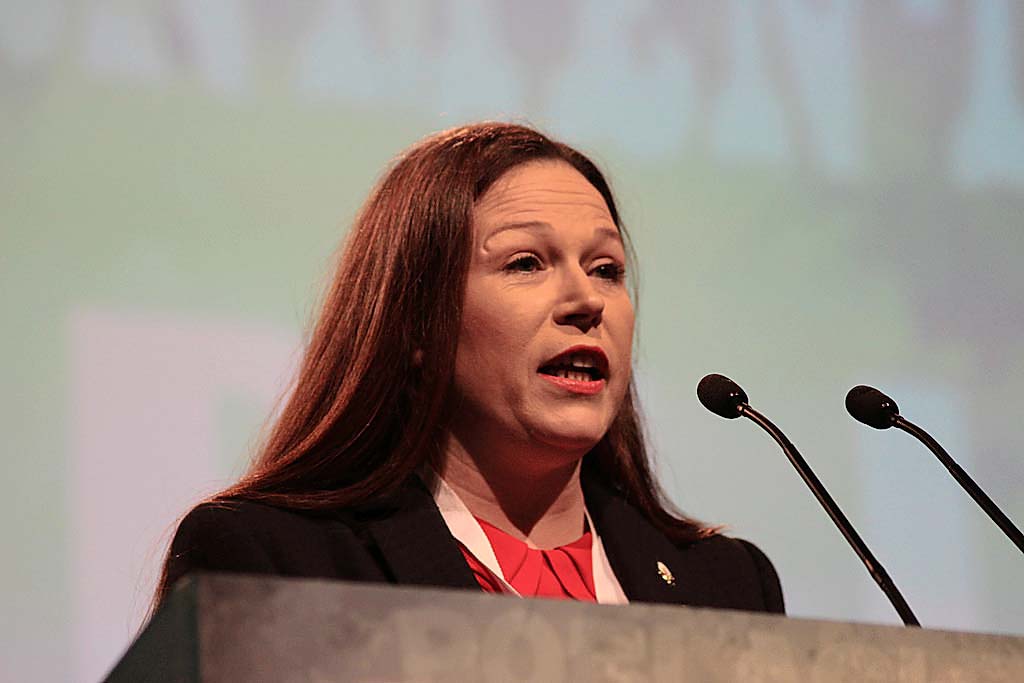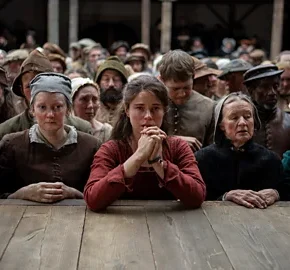Bigelow makes a triumphant return with A House Of Dynamite
Mike Finnerty 15 Oct 2025
8 years is a long time to go without making a film.
When Kathryn Bigelow released her last film, Detroit, in the summer of 2017, Donald Trump had just assumed the role of American president, the British government was in a state of perma-crisis, and Manchester United had a stubborn Portuguese manager in charge.
The more things change, the more they stay the same.
Bigelow’s career has had more than its fair share of ups and downs; she was the first woman to ever win the Oscar for Best Director with The Hurt Locker and made Point Break, an enduring TV classic.
Her big shots at the mainstream, Strange Days and K-19 The Widowmaker were a cult classic in the first instance, and an outright dud in the latter case.
Needless to say, any new project from Bigelow is a major event, just like how Jonathan Glazer made us wait a decade for a new film after Under The Skin and he gave us The Zone Of Interest.
After 8 years out of the game, Bigelow returns to show us all what Hollywood has been missing.
A House Of Dynamite has a killer premise – a nuclear missile is inbound and is about to strike Chicago, and it shows us the different perspectives of the decision-makers as the clock ticks down.
Nuclear issues have made for strong cinematic stories – the success of Oppenheimer in 2023 proved that, films like Fail-Safe and The War Game are a sociological document of Cold War era tensions, The Sacrifice is a stunning swan song for Tarkovsky, and Bigelow makes the most of the premise.
The state of the world in 2025 is, to put it diplomatically, not great, and the very best films are the ones that capture the mood of the time they were made in; Bigelow succeeds with flying colours.
Bigelow’s films have been praised for their documentary-like style and aesthetic (the style is a large part of why The Hurt Locker and Zero Dark Thirty hit as hard as they did), and the aesthetic is interesting to see in a post-Succession world.
Succession reinvented the cinematic grammar of being a fly on the wall and making the viewer think they are in the room with the characters; that style was deeply influenced by the direction style of Bigelow (and Friedkin before her), and seeing Bigelow try to redefine her legacy is just as exciting as the events on the screen.
The hook – a real-time countdown until a nuclear missile hits Chicago – means there is plenty of scope to jump around and see the different perspectives of the decision makers, and there is a 24 by way of Robert Altman feeling to the film.
From 24, we get the ticking clock dynamic and the pressure cooker of being in the President’s inner circle, and from Altman, we get the cutting between different characters and the large ensemble cast.
Bigelow has assembled a great cast to tell the story; Rebecca Ferguson is the closest the film has to a lead character, and she is tasked with conveying that cool under-pressure stoicism that made her a star in Mission: Impossible while mixing Swedish ice queen vibes with her sense of tenderness.
Ferguson is tasked with tracking the trajectory of the missile as it makes its way from across the Pacific Ocean, and it becomes clear it’s about to hit the city of Chicago.
The film makes an effort to show us that this is one ordinary day that goes to hell, and Ferguson’s performance makes the viewer believe her character has a life outside of work, and it might be about to change because of circumstances outside of her control.
Speaking of Oppenheimer, Jason Clarke (or as he’s best known, the guy who is shouting at Cillian Murphy in the interrogation scenes), is in fine form as the military guy who knows the answer to everything; his performance here is less shouty, more 1970s Gene Hackman.
Idris Elba appears as the President tasked with making impossible choices, Jared Harris is the Secretary of Defence who gets more gradually stressed as the clock ticks down, Greta Lee is the intelligence expert who is interrupted on her day off, and the fantastic Tracy Letts is the military officer who tries to keep chipper as the situation unravels.
There is a real sense of verisimilitude from the film; that’s down to the influence of Noah Oppenheim on script duties.
A former journalist who worked in television for years, Oppenheim’s other big credit is the Netflix drama series Zero Day, which aired earlier this year.
While Zero Day came dangerously close to having something to say about modern political discourse and ended up saying nothing, he’s awake here.
A House Of Dynamite’s structure means that we get to know the characters very quickly while the clock works against them, and the film drops the viewer into the middle of a busy and hectic day at the heart of the government.
The film acts like this is a normal day that is quickly going to hell in a handbasket and the script doesn’t have clunky exposition dumps telling us about the characters’ past or stances; it’s very meat and potatoes, which is what a script like this should be.
There is a huge degree of ambiguity with A House Of Dynamite, which is the ace in the hole.
The film sets up at least a dozen different questions and plot threads, and it doesn’t answer them all.
In the age of people thinking plot holes are important and wanting instant gratification, the structure of this film might irk some, but if you approach the film as a nearly documentary-like object, it works brilliantly.
Any film or international relations student is likely to have watched the Oscar-winning documentary The Fog Of War, where filmmaker Errol Morris tries to get a straight answer out of Robert McNamara.
McNamara was the man responsible for pushing the “domino theory” on the Kennedy administration, which resulted in the escalation of the Vietnam War.
In the film, McNamara is slippery, but the closest thing we get to a confession from the JFK cabinet member is that sometimes in war or a crisis, there is always some ambiguity and not all of the questions will be answered.
A House Of Dynamite is absolutely thrilling, absorbing and will leave you wanting more; all signs of a great film.
The film is likely to be Netflix’s big Oscar player this year and the old school approach could go a long way with Oscar voters and viewers alike.
All great films are a snapshot of the culture they were released into; by those merits, A House Of Dynamite captures what it’s like to live in 2025.
Everyone is shouting, the news on our screens is just depressing, and there’s an impending fear that everything is just going to get worse.
It’s fun for all the family!











